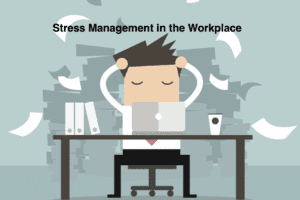Stress Management in the Workplace
Understanding Stress
Work-related stress is a prevalent issue that can potentially lead to mental health problems such as depression or anxiety. Stress has become a focal point alongside mental health awareness due to its significant influence on employees’ lives. To address stress effectively, it is essential to comprehend its causes, identify stressful situations, and determine the steps employers can take to mitigate the underlying factors contributing to the problem.
Defining Stress
According to the Health and Safety Executive (HSE), stress is the reaction individuals experience when faced with excessive pressures or demands that they perceive as overwhelming. It is important to note that stress is a “state” rather than an illness, although it can develop into one if it becomes excessive and prolonged, leading to mental and/or physical health issues.
It is important to differentiate between positive pressure, which can enhance productivity, and the harmful negative effects of excessive pressure.
Causes of Stress
Stress can arise from various sources. The HSE has identified key factors that contribute to work-related stress, with which all managers should be familiar:
- Workloads: Heavy or light workloads can both contribute to stress.
- Control: The level of control employees have over their work can impact their stress levels.
- Support: The support employees receive from their managers plays a vital role in managing stress.
- Role Clarity: The clarity of an employee’s role within the organisation can affect stress levels.
- Relationships: The nature of relationships at work can contribute to stress.
Individual Coping Strategies
Employers often face challenges in managing stress because individuals possess varying abilities to cope with the pressures of work. Most people have developed defence mechanisms or coping strategies to deal with stressful situations. Some individuals excel at effective time management, enabling them to handle rising workloads, while others may be more adept at delegating or refusing additional work when overwhelmed.
Factors such as seniority and self-confidence influence an individual’s capacity to manage stress. Additionally, certain individuals may thrive under extreme time pressure.
Recognising Symptoms of Stress
Identifying the early symptoms of stress can be challenging, as employees may be reluctant to admit that they are struggling to cope. Therefore, it is crucial for employers to be vigilant and recognise warning signs indicating that an employee is experiencing stress. Changes in behaviour, attendance, or attitude are common indicators. Taking prompt remedial action can prevent serious adverse effects on the employee’s health and job performance.
Addressing Work-Related Stress and Absence
When employees report absences due to work-related stress, it is important to conduct return-to-work interviews to determine the reasons behind the absence. Similarly, if employees’ express complaints about stress, it is essential to take their concerns seriously, investigate the causes, and closely monitor the situation.
Proper steps should be taken to manage and alleviate the stress, considering health and safety obligations, potential discrimination or bullying issues, and reasonable adjustments. Dismissal should only be considered as a last resort, as it can be costly in terms of absences, recruitment expenses, and potential legal claims.
Seeking Further Guidance
The HSE offers a dedicated section on its website that specifically addresses stress management. This resource provides guidance and a risk-assessment tool to assist businesses in identifying potential problem areas and adopting appropriate measures.


